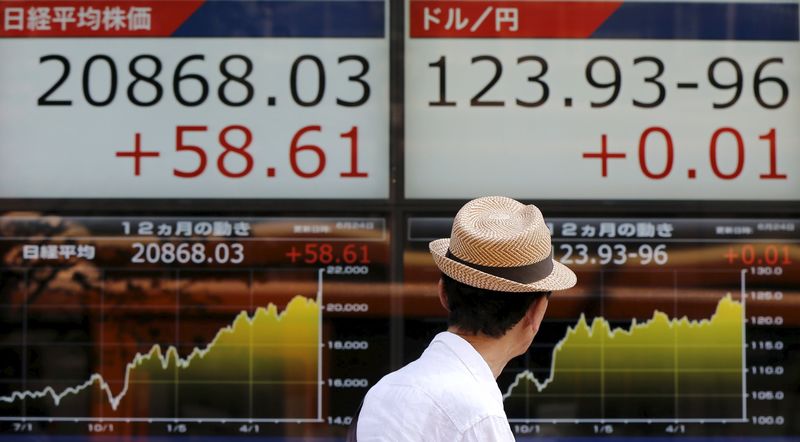Investing.com’s stocks of the week
By Shinichi Saoshiro
TOKYO (Reuters) - Asian stocks fell on Friday as Greece failed again to reach an agreement with its creditors and stumbled towards a default, while major currencies like the euro and dollar drifted in narrow ranges as the debt saga sidelined investors.
Financial spreadbetters expected Britain's FTSE 100 (FTSE) to open down 0.3 percent, Germany's DAX (GDAXI) as much as 0.2 percent lower and France's CAC 40 (FCHI) 0.4 percent lower.
"European equities are set to slide on the open once more as Greek talks draw another blank," Jonathan Sudaria, a dealer at Capital Spreads, said in a note.
Last-ditch talks by euro zone finance ministers will resume on Saturday to either avert a Greek default next week or start preparing for a "Plan B" to protect the euro zone from financial market turmoil. Athens has to repay the International Monetary Fund 1.6 billion euros ($1.79 billion) on Tuesday.
"We are saying, not without careful thought, that this Eurogroup is of decisive importance, taking into account that time is very short and that a result must be worked on," German Chancellor Angela Merkel told a news conference early on Friday.
A breakdown in talks on Thursday again revealed the wide gap in understanding between Greece and its creditors, highlighting the prospect that neither side may accept any proposed concessions. Commentators also pointed to the fact that the German parliament has to ratify any changes first before paying for a bailout.
A Greek exit from the euro zone will be inevitable if Athens and its lenders do not come up with a solution within the next five days, Germany's EU Commissioner Guenther Oettinger said on Friday.
"We will do everything up until the 30th so that the Greeks show they are prepared to reform," Oettinger told Deutschlandfunk radio.
"A 'Grexit' is not our aim but would be unavoidable if there is no solution in the next five days," he said.
The ongoing uncertainty pressured shares across Asia. MSCI's broadest index of Asia-Pacific shares outside Japan (MIAPJ0000PUS) was down 1 percent in late afternoon trade, but still on track for a small weekly rise of 0.3 percent.
Japan's Nikkei (N225) ended down 0.3 percent. Despite household spending rising more than expected, inflation has remained flat, keeping alive expectations for more central bank stimulus later this year.
Volatile Chinese stocks, which often march to their own drum beat, tumbled for a second day as the market struggled to digest a flood of IPOs, tighter cash supply and confusion about government and central bank policy direction.
The CSI300 index (CSI300) of the largest listed companies in Shanghai and Shenzhen and the Shanghai Composite Index (SSEC) were both down more than 6 percent in afternoon trading. [.SS]
Australian shares (AXJO) lost 1.5 percent, while South Korea's Kospi (KS11) bucked the trend and gained 0.4 percent.
In currencies, the euro inched down 0.1 percent to $1.1188
The dollar
With Greece in the spotlight once again, upbeat U.S. data that could have otherwise lifted the dollar by fanning hopes for a rate hike by the Federal Reserve was relegated to the background.
Figures on Thursday showed U.S. consumer spending recorded its largest increase in nearly six years in May, further evidence that economic growth was accelerating in the second quarter.
In commodities trading, U.S. crude added about 0.2 percent to $59.81 a barrel
"Traders and investors are very much on tenterhooks on the outcome (of talks on Greece)," said Ben Le Brun, market analyst at OptionsXpress in Sydney.
